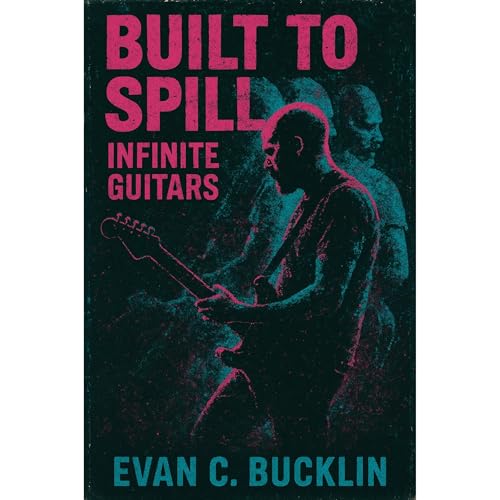
Built to Spill: Infinite Guitars
Doug Martsch and the Expansion of Indie Rock Sound
No se pudo agregar al carrito
Add to Cart failed.
Error al Agregar a Lista de Deseos.
Error al eliminar de la lista de deseos.
Error al añadir a tu biblioteca
Error al seguir el podcast
Error al dejar de seguir el podcast
Compra ahora por $6.99
-
Narrado por:
-
Virtual Voice
-
De:
-
Evan C. Bucklin

Este título utiliza narración de voz virtual
Built to Spill: Infinite Guitars is the first full-scale biography of one of indie rock’s most enduring and beloved bands. Written in a vivid, documentary style that blends musical history with personal portraiture, the book follows frontman Doug Martsch from his Idaho upbringing through the relentless experimentation and resilience that made Built to Spill a cornerstone of American independent music.
From the makeshift basements of Boise to the demanding roadwork of Treepeople, Martsch forged his craft in environments far removed from the industry capitals. His decision to form Built to Spill in 1992 marked a radical break: a band with a rotating membership, built on the premise of impermanence, but guided by his singular guitar voice. The result was a catalog that refused easy categories, stretching from the raw energy of Ultimate Alternative Wavers (1993) to the concise wit of There’s Nothing Wrong with Love (1994), the sprawling epics of Perfect from Now On (1997), and the accessible brilliance of Keep It Like a Secret (1999).
The narrative traces how Martsch negotiated a paradoxical major-label contract with Warner Bros. in the mid-1990s that allowed Built to Spill to remain uncompromising while reaching a national audience. Albums such as You in Reverse (2006), There Is No Enemy (2009), and Untethered Moon (2015) revealed a band constantly reinventing itself. Along the way, Built to Spill became a cult live act, famous for turning modest venues into laboratories of sound, where songs might stretch into fifteen-minute meditations.
The biography also explores Martsch’s rootedness in Boise, showing how the city’s outsider status shaped the ethos of the band. Rather than fleeing to Seattle or Portland during the grunge explosion, Built to Spill made Boise central to its identity, proving that vital art could emerge from unlikely places. Their story is one of humility and ambition, fragility and epic sweep, of guitars that seem to stretch toward infinity while grounded in ordinary lives.
Drawing on contemporary accounts, critical reception, and the long arc of Martsch’s influence, Built to Spill: Infinite Guitars positions the band as a touchstone for generations of indie musicians. From Modest Mouse to The Shins, from Car Seat Headrest to Kurt Vile, echoes of Martsch’s expansive guitar layering and surreal lyricism can be heard across the indie landscape. The book situates Built to Spill within the wider canon, showing how their music resisted both grunge commodification and indie cliché, instead charting a path of authenticity and experimentation.
Spanning three decades, the chapters capture the triumphs and pressures of recording, the exhaustion and exhilaration of endless touring, and the quiet persistence of an artist who never embraced rock-star mythology. By the time of When the Wind Forgets Your Name (2022), Built to Spill had come full circle—returning to Sub Pop, collaborating with Brazilian musicians, and proving that their ethos of openness and exploration still thrived.
Built to Spill: Infinite Guitars is more than the story of a band. It is a chronicle of indie rock’s growth, the resilience of outsider art, and the enduring power of infinite guitars to resonate across generations. Essential reading for fans of Built to Spill, indie rock historians, and anyone curious about how sincerity and experimentation survive in a commercial industry.


